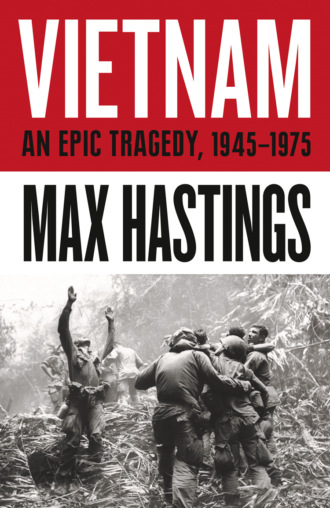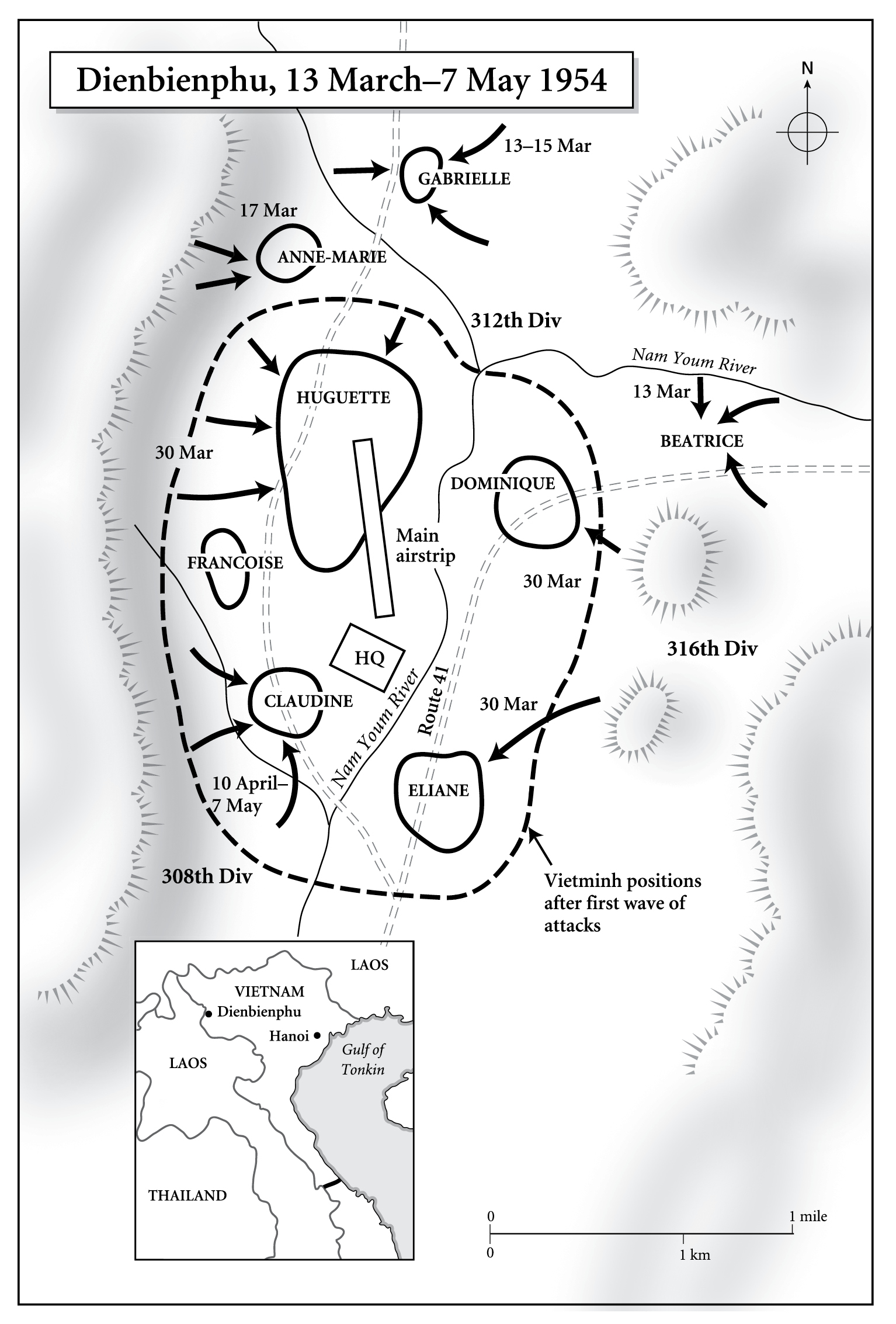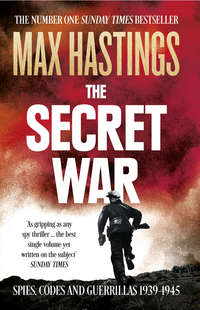
Полная версия
Vietnam: An Epic History of a Divisive War 1945-1975
As the year end approached, Navarre became aware that the Vietminh were deploying howitzers: on 31 December he reported to Paris that the camp might become indefensible. Yet through the first weeks of 1954, boredom was the garrison’s principal enemy. Col. Langlais returned from hospital with a heavily-strapped ankle, and rode about on a little pony. Patrols suffered a steady stream of casualties. Many men yearned for the Vietminh to attack, so that they might be hurled back into their mountain fastnesses, freeing the defenders to adjourn to the fleshpots of Hanoi. Yet some also were apprehensive: Lt. Col. Jules Gaucher wrote to his wife on 11 January: ‘Time passes slowly and nothing interesting happens. They tell us of hard times coming, that will shake us out of our routine. Rumour has it that we are destined for sacrifice.’
During the weeks that followed, the garrison launched several sorties against the enemy’s artillery, all of which failed. Attempts to interdict Giap’s supply routes from the air were also unsuccessful, partly because of the limitations of French B-26 Marauder crews: Langlais once found his positions undergoing an apparent Chinese air attack, then discovered that they had been hit by an errant Frenchman. This was unsurprising when many bombloads were released from twelve thousand feet. Far away from Dienbienphu, the Vietminh staged night commando attacks designed both to sap French air strength and to distract Navarre’s attention. Twenty aircraft, most of them precious C-47s, were destroyed in raids on airfields around Hanoi and Haiphong.
From December onwards Navarre and his colleagues had ample intelligence, shared with their superiors in Paris, to show that they faced the prospect of a full-blooded disaster. Yet they persevered because a lethal cocktail of pride, fatalism, stupidity and moral weakness prevented them from acknowledging their blunder. If the garrison of Dienbienphu had been evacuated, nobody outside Vietnam would ever have heard of the place. There would have been merely a local withdrawal of a kind that had become familiar. Navarre bears principal responsibility, but France’s entire political and military leadership deserves to share. It was the country’s misfortune to be governed and commanded by men burdened with the humiliations of the previous decade, and thus constrained in every decision by a yearning to restore national honour, revive la patrie’s glory. In a spirit of defiance they perpetrated one of the least inevitable military fiascos of the twentieth century.
During the last week of January, the defenders were placed on high alert: intelligence reported that the Vietminh would launch their big assault within hours. Intelligence was right: that was the plan; but then Giap changed it. The foundation stones of the Vietminh commander’s recent successes had been meticulous preparations. To the frustration of his subordinates, Giap now decided that conditions at Dienbienphu were insufficiently propitious. His men were there, sure enough, but not the massive stockpile of artillery and mortar ammunition that he wanted. He postponed the scheduled assault.
His new, revised timetable meant that the impending battle must continue into the wet season, which in that region would be very wet indeed. Giap calculated that his own men, deployed on the hills, would suffer less than the garrison on the plain. In Paris a senior officer agreed, observing gloomily that by April, at the camp command post de Castries would be paddling in a foot of water: ‘We believed we could destroy three of the best Vietminh divisions. Instead the enemy has tied down an important portion of our forces, and it is he who manoeuvres around us.’ There was further discussion of evacuation, but such a course would have meant abandonment of huge stocks of materiel and almost certain extinction of the rearguard. Instead, Navarre reinforced.
For a further seven weeks, which seemed interminable alike to besiegers and besieged, the rival forces gazed at each other across the scrub and hills. Planes came and went. There were skirmishes beyond the perimeter, and a stream of distinguished visitors – military and political grandees, the novelist Graham Greene, the US Army’s Mike O’Daniel – all of whom departed unscathed. Meanwhile air attacks on the Vietminh supply line made little impact. Aircrew were inexperienced, and they dubbed their battered old planes les pièges – ‘the deathtraps’. Many of the 650 French airmen who died in Indochina were victims of human error or mechanical failure rather than of enemy action. The Vietminh learned that while raids were noisy, they inflicted surprisingly few casualties. A young man who survived a strike on his village wrote: ‘Bombing and shelling scared people more than it really hurt them … Repeated bombardments can make people less afraid.’ Moreover, around Dienbienphu aircraft faced increasingly fierce ground fire from Soviet-made 37mm guns. In December, fifty-three planes were hit more or less seriously. Thereafter, as the weather suffered its usual seasonal deterioration, pilots reliant on World War II navigation technology faced ever greater hazards, which caused a steady stream of losses.
From Navarre’s viewpoint, more alarming even than the battlefield story was news from Europe which overnight lofted the stakes at Dienbienphu: there was to be a Big Power summit conference; a negotiation. Soldiers sensed in the air a stench wretchedly familiar to Frenchmen: that of looming betrayal. Unwilling as they were to acknowledge that their own efforts to shoot and shell a path to victory in Indochina were failing, they professed now to see themselves about to fall victim to the machinations of politicians whom they despised.
In the US and Europe, dismay had been growing about the Indochina war. During the early years of the wartime Manhattan Project that created the first atomic bombs, British prime minister Winston Churchill displayed naïveté and even insouciance about its implications. A decade later, however, even despite increasing senility the old statesman was far more sensitive to the perils of unleashing nuclear weapons than were many Americans, including President Dwight Eisenhower. Churchill and his foreign secretary Anthony Eden understood that the newly-created H-bomb was not just another toy of war; that even to threaten its use in fulfilment of foreign policy objectives was a supremely grave proposition.
As the US administration pondered options, prominent among these was that of bombarding China, to punish Mao Zedong for backing the Vietminh. Such a prospect appalled Britain. Although only a few Americans – some wearing uniforms which bore generals’ stars – spoke explicitly of ‘nuking’ the Chinese, once conflict started there was no knowing where it would end. The British cherished a belief in diplomacy that the Eisenhower administration, increasingly contemptuous of its ally’s perceived timidity, did not share. American conservatives denounced as appeasement Britain’s willingness to engage diplomatically with China and the USSR.
The French exit process from Indochina was precipitated by a tense, difficult January 1954 foreign ministers’ meeting in Berlin. Vyacheslav Molotov, for the Russians, urged the convening of a conference at which communist China – hitherto excluded from international gatherings, at American insistence – would be represented. This would address outstanding issues in Asia, notably Korea and Indochina. US secretary of state John Foster Dulles balked. The notion of attending a conference with the communist usurpers of China was anathema. Yet Eden strongly endorsed the idea, with the backing of Churchill. For France, Georges Bidault concurred: the tottering government of which he was foreign minister was desperate to open a dialogue with Beijing about its support for the Vietminh. Dulles then grudgingly acquiesced. On 18 February the foreign ministers announced that a conference would begin in Geneva on 26 April, to which all interested parties would be invited, chaired jointly by Britain and Russia.
Both armies in Indochina were now impelled by a new urgency, to achieve the strongest possible battlefield position in advance of negotiations. Navarre and his subordinates abandoned the seesawing predictions they had made since December, and expressed vacuous hopes of victory. Emboldened by the soldiers’ confidence, the Paris government dismissed out of hand a proposal from India’s leader Jawaharlal Nehru for an immediate Indochina ceasefire. It remains unlikely that the Vietminh would have accepted such a truce, but there it was: the French rejected a chance – the last conceivable chance – to retrieve their stakes from the table at Dienbienphu.
2 DISASTER BECKONS
Far from Paris, amidst the red earthworks, scurrying jeeps and sporadic shellfire of that wilderness outpost in western Tonkin, the French discerned another unexpected development in the enemy camp. Conventional wisdom demanded that artillery should be deployed on reverse inclines, beyond immediate reach of the enemy. Yet Giap, making new rules, sited his howitzers on forward slopes, where their barrels looked down on de Castries’ positions, with sufficient reach to claw most. The guns remained nonetheless almost invulnerable to French counter-bombardment, because they were lodged in tunnels until dragged forward to fire. The plain of Dienbienphu lay a thousand feet above sea level; the loftiest French positions rose six hundred feet higher. Yet only five thousand yards away, the communists held a hill line with an average elevation of 3,600 feet. Giap’s artillery would soon be able to ravage every French movement.
De Castries’ guns and mortars stood in open pits, hideously exposed. A few dismantled eighteen-ton Chafee tanks were flown into the camp and reassembled, providing mobile firepower. But French officers began to understand that they faced an ordeal by bombardment such as few of their men had ever experienced. Increasingly lively communist shelling meant that few men on outlying positions could avail themselves of the joys of the camp’s two field brothels. By mid-February, though no serious Vietminh attack had taken place, 10 per cent of the garrison had already become casualties. Diminished availability of C-47s caused worsening shortfalls in deliveries of supplies and munitions.
On 11 March, Vietminh artillery began to pound planes parked beside Dienbienphu’s runway. From the 13th every take-off and landing came under fire: airspace became unsafe below seven thousand feet. On the 12th René Cogny paid what proved his last visit: his plane departed amid a flurry of incoming shells, which the garrulous general was fortunate to survive. For weeks Giap’s troops had been digging, digging, digging on a scale such as no army had matched since the Western Front in World War I. One of them wrote: ‘The shovel became our most important weapon.’ They created around the perimeter a network of tunnels and trenches which provided both shelter and covered approaches. The French positions focused upon nine hills, to each one of which was allotted the beautiful name of a woman. Isabelle and Béatrice were deemed the strongest, though a newly-arrived para officer noted with dismay the vulnerability of their trenches and emplacements: the garrison might have fared better had its men spent the previous weeks digging as energetically as the besiegers.

On the morning of 13 March, Giap’s 312th Division was read a message from Ho Chi Minh, then joined in singing the Vietminh anthem. That afternoon, its soldiers mustered to attack Béatrice, the eastern French position, less than two miles from the airstrip. At 1705, as the defenders saw the Vietminh beginning to move, they were about to order defensive mortar and artillery fire when Giap pre-empted them. A storm of shells and heavy mortar bombs descended not only on Béatrice, but on widely dispersed targets throughout the camp, especially gun positions and headquarters. The bombardment was extraordinarily accurate, perhaps assisted by Chinese advisers among the Vietminh gunners, who had enjoyed weeks of leisure in which to calibrate ranges and scrutinise de Castries’ strongpoints. Vietminh patrols had reconnoitred with courage and infinite patience, crawling for hours in darkness amongst the French wire and trenches. In particular, they pinpointed the wireless antennae that marked command centres.
Pierre Langlais’ group survived only by a miracle. The colonel himself was standing naked beneath a pierced-fuel-drum shower when the barrage began, and ran unclad into his bunker, seconds before a shell exploded on its roof. He and his officers were left stunned in a chaos of fallen timbers, debris, earth and wrecked equipment; yet a second shell failed to explode. Elsewhere, a red and yellow fireball marked the eruption of the camp’s fuel and napalm dump. All but one of de Castries’ spotter aircraft were wrecked.
As the light faded on 13 March, defending commanders found themselves crippled. Many phone lines had been cut, and radios were working poorly in the usual evening atmospheric mush. The 450-strong Foreign Legion battalion holding Béatrice was understrength and short of officers. Commanders expected an attack, but not before nightfall. The Vietminh had excavated trenches within fifty yards of Béatrice’s perimeter, and from these their infantry stormed forward amidst a cacophony of cries and bugle calls, followed by detonations as bangalore torpedoes exploded beneath the defenders’ wire. Artillery dealt the deadliest blows: at 1830 a shell devastated Béatrice’s command post. As darkness deepened, the occupants of each bunker on the hill were obliged to fight isolated battles beneath the glow of flares. Some Legionnaires imposed heavy losses upon the attackers before succumbing. Within an hour, however, and exploiting a ruthless disregard for their own casualties, the Vietminh occupied positions deep inside the defences.
One French company commander continued to radio for gun support even as his trenches were overrun: ‘Right 100 … 100 nearer … 50 nearer … Fire on me! Les Viets are on top of us!’ Then there was only a hiss of static, as the voice fell silent. Col. Gaucher, who had gloomily predicted to his wife that he and his comrades were ‘destined for sacrifice’, was mortally wounded. Langlais was ordered to take over, but lacked phone and radio links. Soon after midnight the Vietminh secured control of Béatrice, having killed over a hundred defenders and captured twice as many, most of them wounded. Just a hundred men led by a sergeant-major made good their escape. When sunrise came at 0618 on the 14th, a strange silence overhung the battlefield, under a drizzle that turned to heavy rain. The camp’s medical staff emerged blinking and exhausted from their stifling bunker, having handled ten abdominal and ten chest cases, two cranials, fifteen fractures and fourteen amputations. Debris lay everywhere: blackened and burnt-out vehicles, smashed aircraft and equipment. A belated and futile air attack was launched against the Vietminh gun positions.
Then a wounded officer prisoner, Lt. Frédéric Turpin, staggered across from Béatrice to Dominique, bearing from the Vietminh the offer of a truce to evacuate casualties, which Cogny’s headquarters authorised. This was a shrewd psychological move by Giap, since it passed to the garrison responsibility for eight badly wounded men, and acknowledged his army as local victors. Turpin was fortunate enough to secure air evacuation to Hanoi. As for the men who remained, Pierre Rocolle wrote: ‘A stupor fell upon all those not engaged in urgent tasks. Officers and men could not stop asking themselves: “How could a Legion unit have been so swiftly overcome?”’ Cogny’s response was to reinforce the garrison with yet another battalion of paratroopers.
Giap prepared to repeat his success against Gabrielle, further north, defended by the 7th Algerian Tirailleurs, who ate supper in anticipation of a busy night. Sure enough, at 1800 on the 14th, just before sunset, men of the Vietminh’s 308th Division hurled themselves forward. A bitter struggle continued into darkness, lit by flares dropped from an orbiting Dakota. For some hours the defenders clung on, with French artillery harrowing the Vietminh infantry. At 0330 on the 15th, however, renewed communist fire fell on the hill, scoring a hit on the command post which killed or wounded most of its occupants. The French hoped to counter-attack at daybreak, and defending officers were heartened by news of tanks and paras concentrating in readiness. The Algerians had had enough, however. At 0700 on the 15th the first Vietminh soldiers appeared on the crest of Gabrielle. The Tirailleurs, including one company which had not been engaged, scrambled out of their trenches and ran pell-mell down the hill. The communists took possession, and found the battalion’s concussed colonel among 350 prisoners and eighty dead. The newly-arrived Vietnamese battalion was committed to counter-attack across open ground, but in the face of shellfire its men faltered: the assault was abandoned as Tirailleur fugitives trickled into the camp’s shrunken perimeter.
French leaders reeled under this second blow within twenty hours, and chose to attribute blame for Gabrielle’s loss to its officers. Navarre observed in a letter to Marshal Juin in Paris that the collapse of morale had been ‘most conspicuous in the command elements, which had previously displayed high confidence (too much of it, indeed) and tended to veer from one extreme to the other’. The general dispatched two volunteer colonels to Dienbienphu to replace those who had fallen. With the air force conspicuously failing to interdict Giap’s supply routes, Navarre instead proposed a ludicrous scheme to seed rainclouds over the jungle, inundating the communists.
In the camp, several of de Castries’ headquarters officers suffered nervous collapses: the chief of staff sat motionless in his bunker, refusing to remove his helmet. De Castries himself exercised command, but not leadership: he offered his men no ringing oratory nor comradely cheer, instead apparently resigning himself to the administration of a descent towards disaster. Communist howitzers turned their attentions upon French artillery, of which the gunners suffered terribly: one-third of 155mm crews and more than 50 per cent of de Castries’ 120mm mortarmen became casualties. By the third day of battle, half the garrison’s stock of twenty-seven thousand shells was already expended. The French had lost their forward observation positions, so that their remaining guns were forced to fire almost blind, dependent for targets on air photographs of Giap’s lines processed in Hanoi, then parachuted into the camp.
De Castries’ artillery commander, the jolly, roly-poly Col. Charles Piroth, had rashly promised that he could suppress any guns the communists deployed. Now he suffered a lacerating verbal assault from Langlais about the failure of his batteries during the first two nights’ fighting. The colonel retired to his bunker, sobbing despairingly, ‘I am completely dishonoured.’ In truth, it was his superiors who merited disgrace, for choosing to fight a battle in such a place, pitting twelve thousand French and colonial troops against five times their number of Vietminh, led by a commander of brilliance. Piroth nonetheless clutched a grenade to his body, then jerked forth the pin. De Castries sought to conceal the colonel’s suicide, but the news quickly leaked, and was published in Le Monde. On the night of 14 March several shells fell on the main dressing station, killing fourteen men in the triage room and nine post-operative cases, as well as destroying the X-ray facility. Thereafter the wounded suffered terribly: before the end, doctors and surgeons treated 2,665 men, performed 934 operations and watched 319 patients die. The camp’s airstrip continued to be raked by fire which destroyed ten aircraft stranded by bad weather.
The next two days, 15–16 March, passed almost without incident. Vietminh propaganda loudspeakers broadcast surrender appeals to the defenders in French, Vietnamese, Arabic and German. These were not without effect: Cogny had included in Dienbienphu’s garrison, against de Castries’ strongly-expressed wishes, one Vietnamese and two Thai battalions that were known to be unreliable. French officers had always feared that peace negotiations must precipitate a catastrophic unravelling of their local forces, and so it proved. Following the announcement of the looming Geneva conference, many Vietnamese in French service saw who was winning the struggle for Indochina – and that it was not the colonial power. During the night of 15 March, the first trickle of what swelled into a river of desertions took place from the Thai battalion manning position Anne-Marie, a mile and a half south-west of Gabrielle: one strongpoint was entirely abandoned. Shortly afterwards Vietminh bombardment precipitated a wholesale flight. A French forward observer radioed laconically: ‘The Thais are off.’ Anne-Marie 1 and 2 fell into Giap’s hands almost bloodlessly, and he promptly repositioned there his own mortars and recoilless rifles.
Garrison morale was now crumbling in such a fashion that Giap’s formations could probably have overrun the entire camp – as his subordinate officers chafed to do. De Castries wrote later of the chasm between the spirit of the defenders and that of the enemy as being ‘between the men of a national army fighting for independence … and a mercenary force honouring a contract’. Giap, however, refused to be hurried. Dogged, methodical preparation had served him well. Moreover, his formations had bled heavily for their early successes: around a quarter of the infantry attacking Béatrice are thought to have fallen, and one of the battalions assaulting Gabrielle lost 240 dead. Six half-trained Vietminh medics struggled to tend seven hundred wounded.
Amid cascades of shell and mortar fragments, the besiegers paid dearly for their lack of steel helmets, and for early ‘human wave’ attacks. They laboured all night, every night to deepen trenches and extend saps: timber props were carried miles from the nearest forest to the battlefield. A wholesale call-up of reinforcements, many of them untrained teenagers, was undertaken across communist-controlled northern Vietnam: the martyrdom which took place at Dienbienphu was by no means exclusively a French one.
Giap each day studied graphs of supply deliveries – ‘the moving red line’. One morning he demanded of his logistics chief why not a single ton of rice had been delivered the previous night, and was told there had been torrential rain. The general responded, ‘Whether it rains or hails, we cannot allow our soldiers to fight on empty stomachs!’ This was cynical verbiage: he knew full well that many of his men were starving. They received scarcely any meat or vegetables, and by mid-March were eating ‘rice so rotten that we did not know how to cook it’, in the words of a man of the 312th Division. They were deprived of cigarettes, reduced to foraging for edible wild roots and plants.
Yet Giap chose to persist with his assault in the manner he had started it, painstakingly ensuring the success of each thrust, denying to the French any revival of hope. His 37mm flak guns inflicted a crippling toll on aircraft, so that scarcely one returned from the camp unscathed. Through the days and weeks that followed the fall of three of de Castries’ nine hills, Vietminh artillery harried the airstrip. The landing of each of the diminishing procession of medevac flights precipitated a panic-stricken surge of would-be passengers, wounded and otherwise. Photojournalist Jean Péraud filed a dispatch describing the scene, which he likened to 1945 Germany: ‘Cries. Tears. Stampede of wounded towards the door. Never seen anything like it since concentration camp.’ On the 17th the Vietminh made another skilfully-judged ‘humanitarian gesture’, presenting the garrison with eighty-six wounded prisoners. These, of course, merely increased the pressure on the camp’s overburdened medical facilities: among the doctors’ embarrassments was disposal of a mound of amputated limbs.







